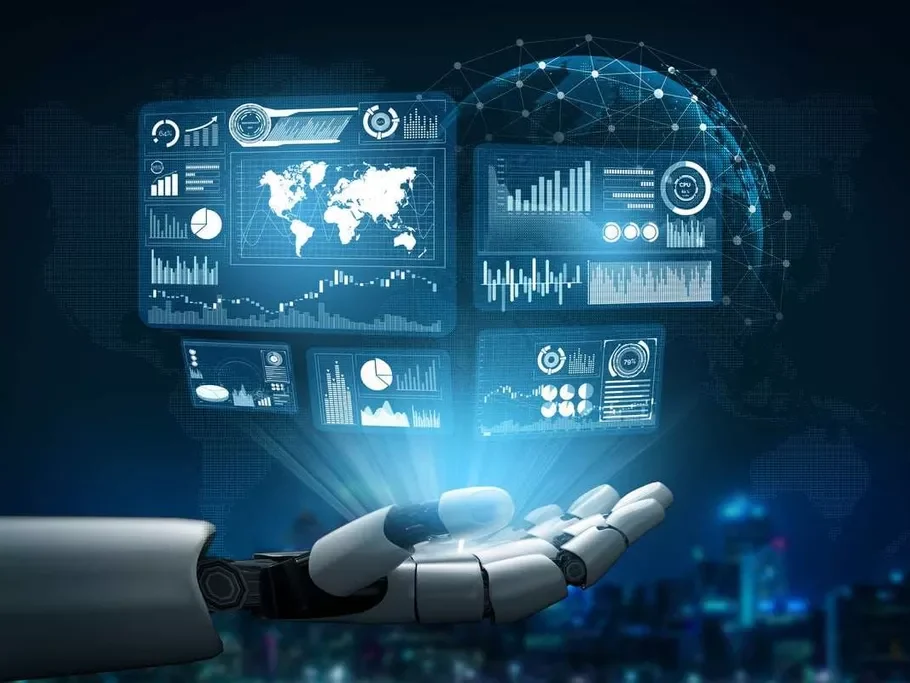Marketers use artificial intelligence techniques to make automated decisions based on data collection and analysis, monitoring target audience preferences and economic trends. AI is an indispensable element of digital marketing, where speed plays a significant role.
AI-based tools use the information and accounts of clients to understand how best to communicate with customers and then send them personal messages at the right time without the intervention of live employees, ensuring maximum efficiency. If we are talking about today’s digital marketers, they use artificial intelligence to expand marketing teams or execute tactical commands that do not require human intervention.
Use cases of AI in marketing
The impact of artificial intelligence on digital marketing is vast. According to Salesforce Research, 76% of customers expect companies to understand their needs and expectations. Marketing using advanced technologies allows professionals to quickly process information from social networks, email, and the Internet. Let’s look at other aspects of why AI for marketers is so valuable.
Content Creation
AI has created a new industry called content analytics, where AI-ruled solutions offer data-driven insights and feedback to content creators. Marketers improve content creation efforts by making a continuous feedback loop and achieving significant success. Here are a few variants of how artificial intelligence positively affects the generation of valuable materials:
- allows you to create optimized posts on social networks
- personalized emails and copies of web pages
- provides A/B testing of landing pages to ensure maximum performance
- improves keyword research
Manually creating content is a long and tedious process. AI for marketers makes post-generation easier and more efficient by providing data-driven feedback on content creation. Advanced techniques help with content profiling, topic discovery, content accuracy, and more.
Predictive analytics
AI helps marketers better determine future behavior to create optimal marketing strategies. With the help of AI-based analytics, you may achieve success in many ways:
- Determine the strengths and weaknesses of your website (loading speed and other technical difficulties).
- Improve the audience assessment procedure to find the most promising potential customers.
- Collect data on the successes and plans of the main competitors.
- Make predictions about customer behavior, e.g., which products will be in the highest demand.
These are just a few ways artificial intelligence improves predictive analytics. Intelligent systems help to find ideas, make predictions and unify information. As technology improves, machines will learn and discover new methods to produce the most accurate results.

Advertising targeting
The system considers the client’s actions and interests before showing him the ad. Thus, marketers benefit from advertising by making it relevant to users. Ads related to products a person has recently searched on a search engine or from a website they have recently visited are standard on the Internet.
Chatbots and communication
As natural language processing advances through artificial intelligence, chatbots are now being used to increase the capacity of customer service agents. Clients with more straightforward queries turn to chatbots to quickly get accurate answers. They can use experience and historical information to provide personalized results. Thus, live agents get more free time to process complex requests that require severe human intervention.
Dynamic pricing
Discounts have always been an excellent option to increase sales. The problem is that customers willing to pay the total amount end up giving away less money, which reduces the company’s profits.
Dynamic pricing eliminates this problem by using machine learning to provide discounts only to those users who need it to make a final purchase decision. Such technology also allows you to send promotional offers to different categories of customers to test several promotions.
Social listening
This technology involves the collection of brand mentions on the Internet and their repeated statement to increase brand awareness. Manually collecting mentions is long and troublesome. Why take on such a burden when AI can do all the work independently?
AI platforms bring the entire social media listening experience into one place. Then you can cut through the noise and choose the necessary social commitments.
Pros and cons of using artificial intelligence in marketing
Marketing benefits from the emergence and development of artificial intelligence, which plays a big role in modern society. It analyzes a large amount of information and makes predictions about the preferences of each customer. It guarantees the effectiveness of targeted marketing campaigns and increases client engagement and satisfaction. Let’s discuss other benefits of AI-ruled tools:
- Simplify complex tasks: after adding artificial intelligence to the company’s work, many tasks can be completed more efficiently and faster. You don’t need to go through every customer’s correspondence to ask what they want to buy. Such a type of work can be done with the click of a button, and the message will reach thousands of clients.
- Economic feasibility: while AI partially displaced workers, it is more cost-effective. AI-based platforms can solve tasks that previously could take three employees one or more days. You can get the job done with minimal energy and data usage.
- Easy targeting: unlike traditional advertising, where it is difficult to understand who received the message and who did not. Adding AI-ruled helps you know in advance how many customers you can reach. It avoids wasting resources and effort.
Don’t forget about some of the downsides of adding artificial intelligence to your marketing strategy:
- Not all people like chatbots and talking on the phone with a computer: if you use simple bots, people understand that they are talking to virtual assistants. Some clients (especially older people) don’t like it. Chatbots need to be implemented carefully, keeping in mind your target audience.
- Computers cannot work without people: there are many films and books about how robots enslave the world. The good news is that in marketing, people are indispensable. Computers cannot change their minds, make unorthodox decisions, or turn on their imaginations.
- Sometimes algorithms make mistakes: it’s hard to imagine a machine is wrong. It may be right in mathematical calculations, but a person is not only data and formulas. People have different tastes and preferences; a mathematical model cannot always describe them.
It is essential to incorporate AI-ruled programs into your marketing campaign carefully. Consider how AI techniques can address pain points. Add AI elements not only because it’s trendy but because it successfully helps customers and quickly turns leads into regular buyers.

Examples of AI for marketers
Artificial intelligence is deeply rooted in many famous organizations. If you are still considering adding AI to your marketing campaign, now is the time to learn more. To make your job easier, we have compiled ten of the most striking examples of the use of artificial intelligence techniques in world-class companies:
- Amazon: the company offers real-time personalization through its «Frequently Bought Together» recommendations. It uses collaborative filtering to predict customer preferences based on the experience of other customers.
- Alibaba: this retail giant has launched a FashionAI physical store in Hong Kong to make it easier to sell stylish AI-ruled clothing. The corporation equipped the marketplace with smart tags for things that detect when a person touches clothes and intelligent mirrors that display data about outfits.
- Starbucks: the corporation analyzes a large amount of information and extracts critical customer data. The mobile app alone has about 17 million downloads, so Starbucks doesn’t run into a lack of knowledge. Specialists use AI-based techniques to understand user behavior, such as which products they like best when they buy them and how they compare to competitors.
- Whole Foods: thanks to a system of sensors and cameras, people can enter the store, fill their bags and leave without going through the checkout. AI-ruled technology, «Just Walk Out» considers each customer and allows people to pay for purchases using artificial intelligence tools.
- Facebook/Meta: this corporation’s image recognition technology has become one of the first in its field. Meta analyzes the image for tags and descriptions but trains its AI-ruled solutions using the DeepFace deep learning platform, which guarantees recognition accuracy with minimal errors. In addition, Facebook pays a lot of attention to targeted advertising to reach the maximum level of market capitalization and beat the competition.
- Netflix: such a content streaming service uses AI-based machine learning technology to provide personalized content recommendations based on the user’s interests and what the user has previously selected. In addition, Netflix uses intelligent systems to optimize streaming quality and eliminate buffering issues.
- The Economist: this authoritative digital publication analyzes website and app usage anonymously to determine reader preferences and get as close to its online audience as possible. The company focused on matching cookies, subscribers, and additional information to find other segments and create lookalike audiences.
- Nestle: such a food giant uses natural language processing (NLP) technologies to power content marketing efforts and create customized communications for different target audience segments.
- Sephora: this beauty brand was one of the first to use chatbots to distribute beauty tips in their work. These bots help customers narrow choices, starting with surveys about their beauty preferences. It is a handy feature for the cosmetics industry, given the vast range of products and the challenges of buying without personal testing.
- Google: Voice search is one of the most common and interactive use cases of AI in marketing. Google technology may recognize the user’s voice and the question he asks and then displays the most relevant results.
According to Econsultancy, 80% of marketers believe that artificial intelligence increases the efficiency of their activities, and these specialists are ready to use advanced technologies. The role of artificial intelligence in marketing activities will only increase because the freedom of technology allows creativity to flourish. Soon, with the help of AI for marketers, professionals will not only be able to observe customers and analyze their information throughout the entire journey to purchase. Instead, professionals will be inspired by everything they do right and dialogue with clients about possible improvements.
